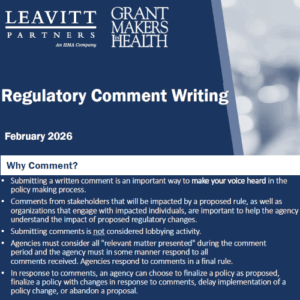Policy Resource: Regulatory Comment Writing
This resource provides an overview of how to write and submit a regulatory comment to the federal register.
Rural Health Care: Innovations in Policy and Practice
All too often discussions of rural health policy concentrate almost exclusively on the challenges in rural areas. But while it is true that rural America has not been immune to the effects of major economic and societal trends, rural areas’ responses to these challenges demonstrate that they are often ideal incubators for innovative policies and practices.
Effective Community Programs to Fight Health Disparities
Eliminating disparities in health status and health care has been an area of substantial interest and programming among health funders at the national, state, and local levels for well over a decade. The latest findings from research and ongoing experience on the ground allow us to assess the progress being made. Engaging with communities in their fight against disparities is also becoming increasingly important to funders.
Bridging, Building, and Beyond: Breaking Down Barriers to Health Improvement
This resource portfolio from GIH’s 2008 annual meeting Bridging, Building, and Beyond: Breaking Down Barriers to Health Improvement, features six essays written by GIH staff.
Establishing Public-Private Partnerships for Maternal and Child Health
Established in 1935 under Title V of the Social Security Act, the Maternal and Child Health (MCH) Services Block Grant is one of the largest federal block grant programs and a critical source of flexible funding for public health. Commonly referred to as Title V, the MCH block grant is used to support core MCH public health functions in states, assess needs, and identify and address gaps in services.
Strengthening the Performance and Effectiveness of the Public Health System
The public health system is the backbone of our nation’s health, but the existing public health infrastructure is inadequate to address the health challenges currently facing this country. Strengthening the Performance and Effectiveness of the Public Health System shares how health funders can improve the functionality of the public health system and develop capabilities, services, and competencies that enhance public health practice.
Connecting the Dots: Developing a Holistic Picture of Children’s Health
Health care services are one of many supports and resources needed to support healthy children. In recognition of the need to take a more comprehensive approach to child health, health funders are being challenged to work outside traditional purviews.
Join & Become a GIH Funding Partner Today!
Click here to learn more about becoming a GIH Funding Partner and joining the largest national network of health funders.

